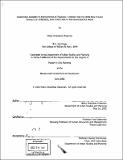Overcoming barriers to participation in training : lessons from the home health care workers of 1199/SEIU, New York's Health and Human Services Union
Author(s)
Chapman, Hilary S
DownloadFull printable version (5.729Mb)
Other Contributors
Massachusetts Institute of Technology. Dept. of Urban Studies and Planning.
Advisor
Paul Osterman.
Terms of use
Metadata
Show full item recordAbstract
This thesis explores the barriers to participation in the 1199 Home Care Industry Bill Michelson Education Fund (Home Care Education Fund). The Home Care Education Fund is structured as a Taft-Hartley, joint labor-management training fund to provide skills upgrading opportunities to unionized home care workers. It is the only such fun in the United States devoted exclusively to home care workers. Home care is a growing sector of the health care industry, and home attendants and home health aides are projected to be among the fastest-growing occupations in the following decade, according to the Bureau of Labor Statistics. Home care workers are also some of the most economically disadvantaged workers in the health care sector, earning poverty-level wages and, with the exception of 1199/SEIU members, lacking health insurance and pension benefits. Three sets of stakeholder groups were interviewed for this thesis: home care workers, who participated in a series of focus group meetings and personal interviews; home care agency employers; and Home Care Education Fund and ETJSP staff members. A written survey instrument was implemented to home care agency employers regarding their staffing levels and training benefits to supplement personal interviews. Each group articulated a coherent set of barriers facing home care workers, with unique challenges facing the agency employers and Education Fund staff in meeting the workers' needs. It is argued that shared interests bind these groups together and that a considerable overlap exists between the provision of quality medical care, welfare and job training policies. Further, there is an urgent need to support a frontline, marginalized workforce that is caring for thousands of disabled and elderly clients on a daily basis. The ultimate goal of this thesis is to identify those key barriers that prevent participation in the Home Care Education Fund so that staff and trustees may work together to tailor their services to meet their unique needs. It concludes with supporting recommendations for workforce development policy.
Description
Thesis (M.C.P.)--Massachusetts Institute of Technology, Dept. of Urban Studies and Planning, 2002. Includes bibliographical references (leaves 69-72).
Date issued
2002Department
Massachusetts Institute of Technology. Department of Urban Studies and PlanningPublisher
Massachusetts Institute of Technology
Keywords
Urban Studies and Planning.